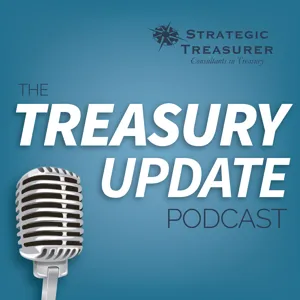Podcast Summary
Yield Curve Inversion: A Reliable Recession Indicator: The inversion of the yield curve, where short-term rates are higher than long-term rates, is a reliable indicator of an upcoming recession since 1969
The yield curve, an important economic indicator, is currently signaling potential economic trouble ahead. The yield curve, which refers to the relationship between short-term and long-term interest rates on U.S. government bonds, has been a reliable recession indicator since 1969. When the short-term rate is higher than the long-term rate, it's a sign that investors are uncertain about the future and are seeking the safety of long-term bonds, pushing down long-term interest rates. Duke University economist Campbell Harvey, who discovered the yield curve's predictive powers, explains that this inversion is a "code red" signal. In normal economic conditions, long-term rates are higher than short-term rates to incentivize investors to lock away their money for longer periods. But when economic storm clouds are on the horizon, investors flock to long-term investments, reducing the demand for higher interest rates. This inversion has occurred before every recession since 1969, making it a reliable, albeit ominous, indicator.
Despite the inverted yield curve, the economy might avoid a recession due to strong employment and reduced debt levels: Historically unreliable yield curve might not signal an imminent recession due to robust employment and lower debt levels among Americans
Despite the inverted yield curve, which historically has been a reliable indicator of an approaching recession, there are reasons to believe that the economy might be able to avoid one this time around. The current employment situation, with a large number of job openings relative to unemployed people, means that the duration of unemployment is short, and the tech sector, which has seen a significant number of layoffs, had an extraordinary hiring rate in the last three years. Additionally, Americans have far less debt now than they did during the 2008 financial crisis, which means they are better equipped to withstand a potential housing market downturn. Lastly, the widespread awareness of the yield curve as a recession indicator might make businesses more cautious in their investments, allowing them to better withstand slower growth. However, it's important to note that these factors do not guarantee that a recession won't occur, but they do suggest that the economy might be more resilient than it appears.
Fed's Aggressive Rate Hikes Concern Economist Campbell Harvey: Economist Campbell Harvey raises concerns over the Fed's aggressive rate hikes, suggesting a pause could prevent a deep recession and ease strain on banks caused by inverted yield curve
Economist Campbell Harvey expresses concerns that the Federal Reserve may be overreacting to inflation by raising interest rates too aggressively. He believes that the inflation battle is nearing an end and that a pause in rate hikes could prevent a deep recession. Additionally, Harvey warns that continuing to raise rates could negatively impact banks, particularly when combined with an inverted yield curve. This situation can create financial strain for banks as they pay higher interest rates for short-term deposits while their long-term investments lose value. Harvey emphasizes that his findings on the yield curve are not infallible and that the Fed's decision on interest rates has various perspectives among economists. The government bond market, often considered safe and boring, remains a crucial part of the financial landscape, providing investors with a dependable investment option.
Government Bonds: Hidden Risks: Despite their creditworthiness, U.S. government bonds can be volatile, with risks from inflation, interest rate changes, and liquidity concerns.
While U.S. government bonds may seem low-risk due to the creditworthiness of the issuer, they are not entirely risk-free. Priya Misra, head of global rate strategy at TD Securities, explains that the market for these bonds can be volatile, particularly in times of economic instability. For instance, during the COVID-19 crisis, a 30-year U.S. government bond issued in 2020, despite its guaranteed return, carried the risk of inflation. As interest rates rise, the purchasing power of the bondholder's future returns decreases. Additionally, the liquidity of older bonds can be a concern. Misra likens investing in U.S. government bonds to welcoming a large cat onto your lap – they may appear safe and reliable, but they possess hidden risks. So, while government bonds can be a crucial part of a diversified investment portfolio, it's essential to be aware of the potential risks and monitor market conditions closely.
Understanding the risks of investing in U.S. Treasuries: Investing in Treasuries involves risks including inflation, opportunity cost, and interest rate risk, which can impact the value of the bonds.
Investing in U.S. Treasuries, while offering a certain level of safety, comes with risks that should be carefully considered. Inflation risk, opportunity cost risk, and interest rate risk can all impact the value of Treasury bonds. Inflation erodes the purchasing power of the bond's interest payments and principal over time. Opportunity cost risk refers to the potential for earning higher returns by investing in other assets with similar risk profiles. Interest rate risk, which has recently caused market volatility, is the risk that rising interest rates will cause the price of existing bonds to fall. For example, if you bought a 1.25% Treasury bond in 2020 when rates were low, but interest rates have since risen, the bond's price will be lower than if you had bought a new bond with a higher interest rate. This is because new bonds offer higher yields to attract investors, making older bonds less desirable. While these risks can be managed, they are important to be aware of when considering an investment in Treasuries.
Bond market volatility causing economic uncertainty: Economic growth and stability may be hindered due to bond market volatility and uncertainty over Fed actions
The current volatility in the bond market, driven by uncertainty over the Federal Reserve's actions and economic conditions, is having ripple effects throughout the economy. This volatility increases risk aversion and hesitance to make decisions, from companies holding off on investment plans to individuals delaying home purchases. The Fed's efforts to cool the economy and bring inflation down by making borrowing more difficult could contribute to these challenging conditions. Ultimately, this uncertainty and volatility can hinder economic growth and stability.






